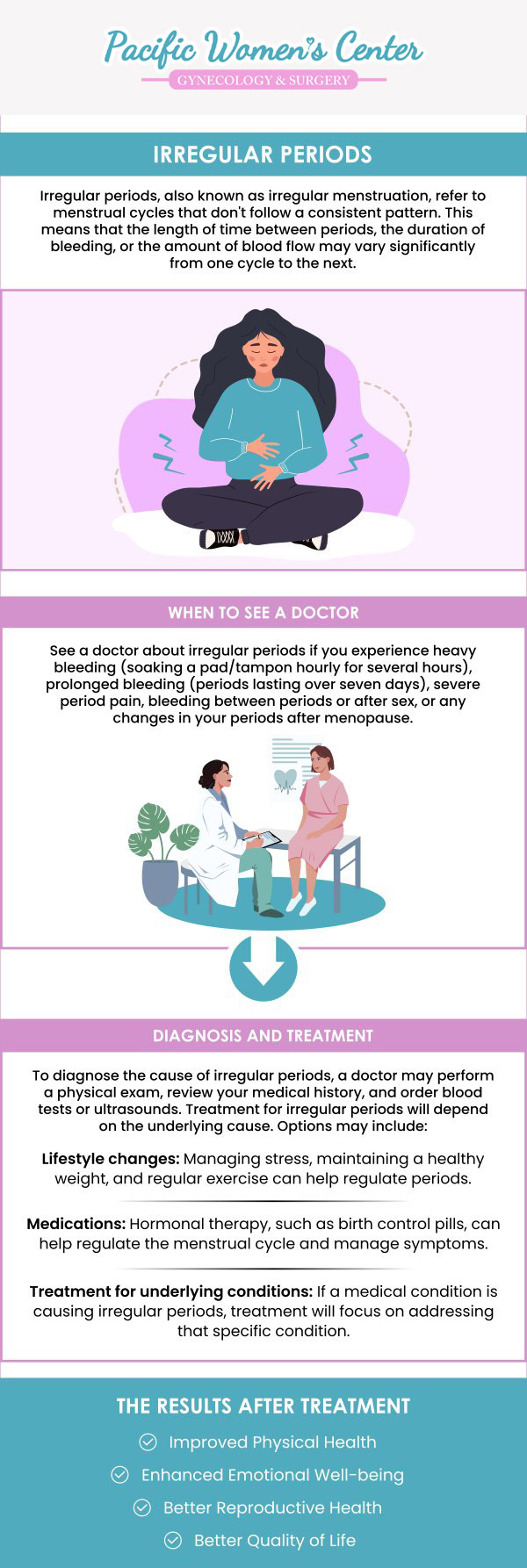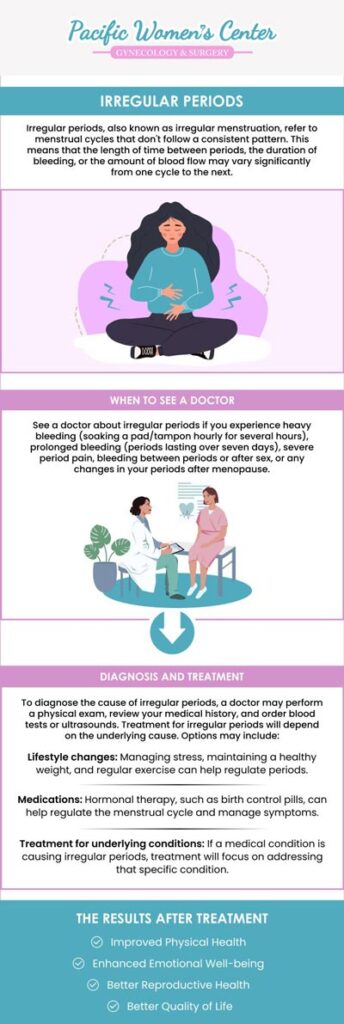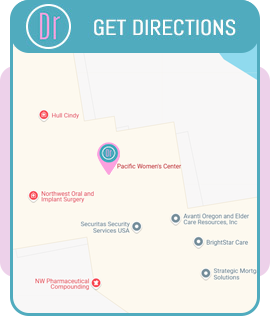What’s the Best Approach for Managing Irregular Periods?
At Pacific Women’s Center in Eugene, OR, managing irregular periods begins with understanding the underlying causes. Dr. Richard Beyerlein, MD, CPI, FACOG, and Dr. Tamara A. Stenshoel, MD, FACOG, provide personalized care to help regulate your menstrual cycle. They work with you to identify potential factors such as hormonal imbalances, stress, or conditions like PCOS and endometriosis. Treatment options may include medication, lifestyle changes, or hormone therapy tailored to your specific needs. For more information, contact us or schedule an appointment online. We are conveniently located at 911 Country Club Rd. Suite 222, Eugene, OR 97401.


Table of Contents:
What causes irregular periods and how can they be managed?
When should I see a doctor for irregular periods?
What lifestyle changes can help regulate periods?
How do hormonal imbalances affect my period?
Irregular periods can result from a variety of factors, including hormonal imbalances involving estrogen and progesterone. Conditions like polycystic ovary syndrome (PCOS), a common cause of hormonal disruption, can lead to irregular or absent periods. Our experienced practitioners at Pacific Women’s Center are skilled in diagnosing and managing PCOS, offering comprehensive treatment plans that may include medications like metformin to address insulin resistance and normalize menstrual cycles.
Thyroid dysfunction, whether hyperthyroidism or hypothyroidism, can also impact menstrual regularity. Our healthcare providers will conduct thorough evaluations to determine if thyroid issues are contributing to your irregular menstrual bleeding and can recommend appropriate thyroid hormone therapy to help restore balance.
Lifestyle factors are equally important in managing menstrual irregularities. Stress, significant weight changes, and excessive exercise can all influence the menstrual cycle. At Pacific Women’s Center, we emphasize holistic care, encouraging stress-reducing practices such as mindfulness, yoga, and meditation. We also offer guidance on maintaining a healthy weight through a balanced diet and moderate exercise, ensuring that your lifestyle supports optimal hormonal health.
Our approach to treating irregular periods is comprehensive and compassionate. We believe in empowering our patients by providing education and support, helping you make informed decisions about your health. Whether it’s through hormonal treatments, lifestyle modifications, or addressing psychological factors related to eating disorders, our goal is to develop a personalized treatment plan that addresses your unique needs.
If your periods consistently last longer than seven days or occur more frequently than every 21 days, it may be time to seek advice from one of our healthcare professionals. Similarly, if you experience excessively heavy bleeding that requires changing your pad or tampon every hour for several consecutive hours, it is advisable to consult with us.
Other signs that warrant a medical evaluation at Pacific Women’s Center include significant pain during menstruation that disrupts your daily life or if you notice spotting or bleeding between periods. Additionally, if your menstrual cycle suddenly becomes erratic after being regular, or if you have missed periods for three or more consecutive months without a known cause, such as pregnancy, we recommend scheduling an appointment to rule out underlying conditions. Furthermore, if you have symptoms such as fatigue, dizziness, or shortness of breath accompanying your irregular menstrual, these could be signs of anemia or other health issues that need attention.
Our specialists can also assist if you suspect you might have a hormonal imbalance or conditions such as polycystic ovary syndrome (PCOS), thyroid disorders, or if you are experiencing symptoms of menopause at an unusually early age. For those trying to conceive, our healthcare providers can help identify any potential fertility issues related to irregular or late periods.
At Pacific Women’s Center, we are committed to providing personalized care to address any changes in your menstrual cycle that cause concern or interfere with your quality of life. Schedule a visit with us today for a thorough evaluation and appropriate management tailored to your needs.
At Pacific Women’s Center, we focus on a holistic approach to managing menstrual health. Our specialists emphasize the importance of maintaining a healthy weight, which plays a critical role in regulating menstrual cycles. We guide our patients toward adopting a balanced diet rich in whole foods such as fruits, vegetables, whole grains, and lean proteins, which can help achieve and maintain both a healthy weight and hormonal balance.
Regular physical activity is another key aspect of menstrual health, and we work with patients to develop personalized exercise plans that promote balance and prevent excessive exercise that could disrupt the cycle. We also understand the significant impact of stress on menstrual regularity, and we offer resources like meditation, deep breathing, and mindfulness techniques to help manage stress.
Additionally, good sleep hygiene is vital for hormonal balance, and we provide tips to help patients establish a consistent sleep schedule for better menstrual health. Our healthcare providers also discuss the impact of lifestyle habits such as caffeine, alcohol, and smoking on menstrual cycles and offer support in making healthier choices. For those interested in natural remedies, we can explore options like ginger, cinnamon, and turmeric, while always ensuring that any new supplement is appropriate for your health needs. At Pacific Women’s Center, we are committed to providing personalized care tailored to your unique needs. We encourage you to schedule a consultation to discuss your menstrual health and create a plan that supports your overall well-being.
Hormones such as estrogen and progesterone play crucial roles in regulating your menstrual cycle. Imbalances in these hormones can lead to a variety of menstrual irregularities. You may experience changes such as irregular periods, where your cycle becomes shorter or longer than usual, or even skip periods altogether, a condition known as amenorrhea. Additionally, heavy or prolonged menstrual bleeding (menorrhagia) can be a result of hormonal imbalances.
Beyond menstrual irregularities, hormonal imbalances can also cause premenstrual symptoms like mood swings, bloating, and breast tenderness. Conditions such as polycystic ovary syndrome (PCOS) are common culprits, often leading to infrequent or prolonged menstrual periods. Thyroid disorders, which influence hormone production, can also disrupt your menstrual cycle, resulting in lighter or heavier periods.
At Pacific Women’s Center, we recognize the impact of factors like stress, weight changes, and lifestyle on your hormone levels and menstrual health. Our approach is holistic, considering all aspects of your health to provide personalized care.
If you suspect hormonal imbalances are affecting your menstrual cycle, we encourage you to reach out to our team. We offer thorough evaluations and work with you to develop individualized treatment plans, which may include medical interventions or lifestyle adjustments to help restore hormonal balance and improve your menstrual health. Your well-being is our priority, and we are here to support you every step of the way.
At Pacific Women’s Center, we are committed to helping you achieve a healthy, balanced cycle. Our expert team, led by Dr. Richard Beyerlein, MD, CPI, FACOG, and Dr. Tamara A. Stenshoel, MD, FACOG, offers compassionate care to address your menstrual concerns. We’ll work with you to develop a customized treatment plan that fits your lifestyle and supports your overall well-being. For more information, contact us or schedule an appointment online. We are conveniently located at 911 Country Club Rd. Suite 222, Eugene, OR 97401. We serve patients from Eugene OR, Springfield OR, Coburg OR, Creswell OR, Cottage Grove OR, Lowell OR, and Junction City OR, and surrounding areas.

ADDITIONAL SERVICES YOU MAY NEED
❱ Abdominal Hysterectomy
❱ Bladder Lift Surgeon Q&A
❱ Cervical Cone Biopsy
❱ Colposcopy
❱ Endometrial Ablation
❱ Endometrial Biopsy
❱ Female Sexual Dysfunction
❱ Gynecological Surgery
❱ Gynecology
❱ Hormone Therapy
❱ Vaginal Hysterectomy
❱ Endometriosis Diagnosis & Care



